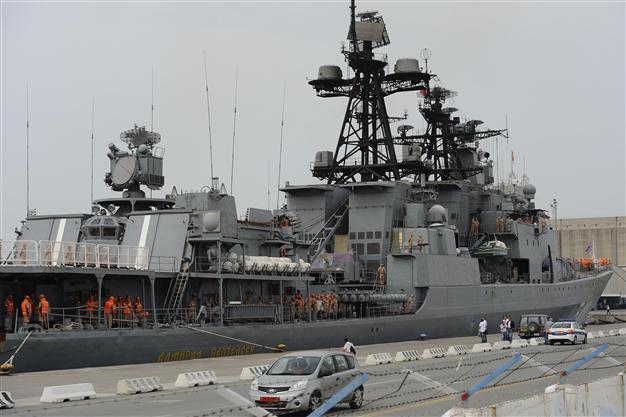Russia sends Syria advanced anti-ship missiles: US officials
WASHINGTON - Reuters

Russian sailors are seen aboard the Admiral Panteleyev Russian war ship moored at the Cypriot port of Limassol on Friday, May 17, 2013. Russian naval vessels including the destroyer Admiral Panteleyev, the tanker Pechenga and the rescue tugboat Fotiy Krylov docked at Limassol as part of a four-day visit to the Mediterranean island, Russia?s defense ministry said in a statement. AP photo
Russia has sent Syria advanced anti-ship missiles, U.S. officials told Reuters on May 17, bolstering Syrian defenses despite pleas from Washington and elsewhere to stop supplying President Bashar al-Assad's forces.
One of the officials, who spoke on condition of anonymity, said the latest Yakhont surface-to-air missiles were delivered recently. The transfer of the missiles was first reported by the New York Times.
There was no immediate comment from the Russian government. The disclosure comes just over a week after U.S. Secretary of State John Kerry suggested that he raised the issue of arms transfers to Syria during talks in Moscow this month.
The Russian arms transfer could intensify a push by some lawmakers in Congress for the United States to deepen its role in Syria, particularly after President Barack Obama's government acknowledged preliminary intelligence that Assad's forces likely used chemical weapons.
"We can watch from the sidelines as the scales are tipped in Assad's favor, or protect U.S. national interests by supporting the armed opposition striving to build a new Syrian future," said Senate Foreign Relations Committee Chairman Robert Menendez.
Hard-to-detectThe anti-ship missiles supplied by Russia are designed to keep hostile ships away from Syrian waters. They fly at just over 2.5 times the speed of sound, have a range of about 300 kilometers (185 miles) and pack a huge punch from their 200 kg (440 pound) warhead, according to Nick Brown, editor in chief of IHS Jane's International Defense Review.
"They are hard to detect and even harder to shoot down or decoy away, so they're a powerful tool for keeping warships a long way off the Syrian shore," Brown said.
A spokesman for Russia's state arms exporting monopoly, Rosoboronexport, would not comment when asked about the shipment of a new batch of Yakhont missiles to Syria.
Russia previously delivered Yakhont missiles in 2011 in a deal estimated at $300 million at the time. Russian Foreign Minister Sergei Lavrov has defended Russia's arms sales to Syria by saying that Moscow is only fulfilling previously sealed contracts and did not want to lose its reputation as a reliable supplier.
Russia, which has protected Assad from three consecutive U.N. Security Council resolutions aimed at pressuring him to end violence, has been a large supplier of arms to Syria.
Moscow sold nearly $1 billion worth of arms to Damascus in 2011 though its sales fell significantly last year, according to data released by Moscow-based defense think tank CAST.
US officials also confirmed a report that Russia has deployed a dozen or more warships to patrol waters near its naval base in Syria.
But many US officials fear weapons could fall into the wrong hands. Reuters on May 17 reported that al Qaeda's Iraq-based wing is eclipsing the Islamist Nusra Front. Al Qaeda in Iraq includes thousands of foreign fighters whose ultimate goal is not toppling Assad but anti-Western jihad.
Obama said May 16 during a joint press conference with Turkish Prime Minister Recep Tayyip Erdoğan he would consider both diplomatic and military options to pressure Assad, but insisted that U.S. action alone would not be enough to resolve the Syrian crisis.
The United States and Russia have agreed to convene a conference to try to stop the war, but no date has been set.
